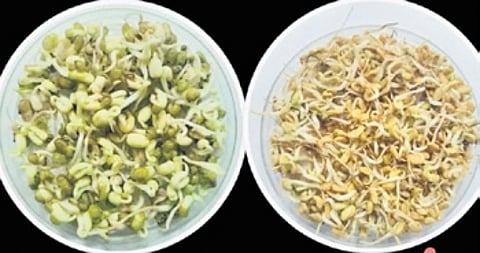Seeds from UAS Bangalore, IIT Dharwad sent to ISS for space farming research
DHARWAD: The University of Agricultural Sciences (UAS), Bangalore, and Indian Institute of Technology (IIT), Dharwad, have sent two types of seeds to the International Space Station (ISS) as part of the Axiom-4 research mission which was launched on Wednesday.
The pack of 25 grams green gram and fenugreek seeds will get sprouted in space while the same quantity of seeds will be grown in the same condition at the UAS campus to assess the sprouting seeds in detail. Shubhanshu Shukla, the ISRO astronaut, will water the seeds and will bring back the sprouted seeds home. UAS Vice-Chancellor PL Patil said the research will play a vital role in developing nutritious salad vegetables for future space missions.
Sprouted green gram and fenugreek are expected to help astronauts in managing issues related to immunity, bone, kidney and heart. It also helps to avoid carrying food in packets.
“Principal Investigator Ravikumar Hosamani, Assistant Professor, Department of Biotechnology (UAS), and Co-Investigator Sudheer Siddapureddy, Associate Professor, IIT Dharwad, have contributed to the project,” he added.
The sprouted seeds will be compared with the seeds grown here and in space to check the difference, including nutrition and other parameters.
The experts were at Kennedy Space Centre in Florida from June 8 to June 11 and handed over the seeds. The seeds were sent in 12 containers. Each container has a payload of four grams, approximately.
A plant-based food production system is crucial for supporting long-term human space exploration. Salad crops like lettuce, tomato, radish, cabbage, carrot and onion, which can be handpicked and eaten fresh, are ideal for supplementing the crew’s diet in space.
However, cultivating mature plants in space requires complex controlled environments, including programmable lighting, temperature, relative humidity, CO2 levels, and water nutrient delivery system.
For India, focusing on space agriculture, food and nutrition research is essential, as Indian astronauts have different dietary preferences and genetic backgrounds compared to Western astronauts.

